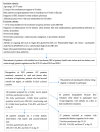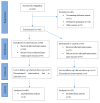A Starch- and Sucrose-Reduced Diet in Irritable Bowel Syndrome Leads to Lower Circulating Levels of PAI-1 and Visfatin: A Randomized Controlled Study
- PMID: 35565656
- PMCID: PMC9101041
- DOI: 10.3390/nu14091688
A Starch- and Sucrose-Reduced Diet in Irritable Bowel Syndrome Leads to Lower Circulating Levels of PAI-1 and Visfatin: A Randomized Controlled Study
Abstract
Irritable bowel syndrome (IBS) is characterized by gastrointestinal symptoms. Overweight and increased risk of metabolic syndromes/diabetes are observed in IBS, conditions associated with plasminogen activator inhibitor-1 (PAI-1) and visfatin. The aim of this study was to measure blood levels of AXIN1, cholecystokinin (CCK), enkephalin, ghrelin, neuropeptide Y (NPY), PAI-1, and visfatin before and after a 4-week intervention with a starch- and sucrose-reduced diet (SSRD). A total of 105 IBS patients were randomized to either SSRD (n = 80) or ordinary diet (n = 25). Questionnaires were completed, and blood was analyzed for AXIN1 and hormones. AXIN1 (p = 0.001) and active ghrelin levels (p = 0.025) were lower in IBS than in healthy volunteers at baseline, whereas CCK and enkephalin levels were higher (p < 0.001). In the intervention group, total IBS-symptom severity score (IBS-SSS), specific gastrointestinal symptoms, psychological well-being, and the influence of intestinal symptoms on daily life were improved during the study, and weight decreased (p < 0.001 for all), whereas only constipation (p = 0.045) and bloating (p = 0.001) were improved in the control group. PAI-1 levels tended to be decreased in the intervention group (p = 0.066), with a difference in the decrease between groups (p = 0.022). Visfatin levels were decreased in the intervention group (p = 0.007). There were few correlations between hormonal levels and symptoms. Thus, this diet not only improves IBS symptoms but also seems to have a general health-promoting effect.
Keywords: AXIN1; cholecystokinin (CCK); enkephalins; ghrelin; irritable bowel syndrome (IBS); plasminogen activator inhibitor-1 (PAI-1); starch- and sucrose-reduced diet (SSRD); visfatin.
Conflict of interest statement
The authors declare no conflict of interest.
Figures





References
-
- Sperber A.D., Dumitrascu D., Fukudo S., Gerson C., Ghoshal U., Gwee K.A., Hungin A.P.S., Kang J.Y., Minhu C., Schmulson M., et al. The global prevalence of IBS in adults remains elusive due to the heterogeneity of studies: A Rome Foundation working team literature review. Gut. 2017;66:1075–1082. doi: 10.1136/gutjnl-2015-311240. - DOI - PubMed
Publication types
MeSH terms
Substances
Grants and funding
LinkOut - more resources
Full Text Sources
Miscellaneous

